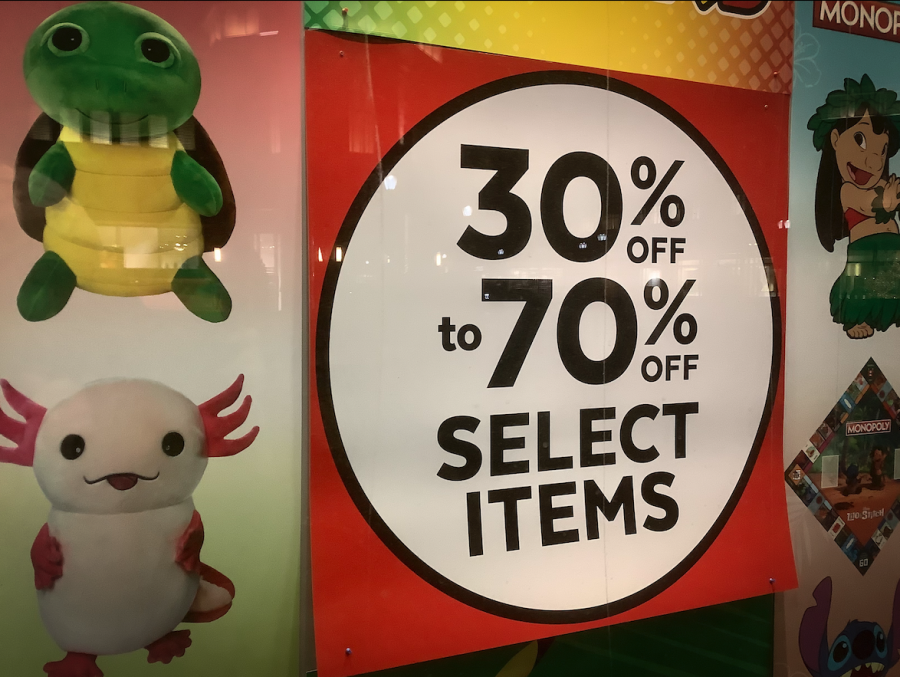Keep calm and shop on: The dark side of our holiday spending habits
Consumerism reaches an unwelcome high during the holiday season. Posters advertising discounts attract large amounts of shoppers, and companies make huge profits.
January 20, 2023
The holidays have gotten messy.
It’s not just the festivities we commonly think of as “more chaotic” than others due to their hectic and fast-paced nature — it’s all holidays, and the season in which they are celebrated does not matter.
The timeless traditions associated with holidays, as well as any religious or cultural significance they may carry, have become diluted with empty wishes and hopes of receiving a gift.
After a full year of observing the clothes worn by their classmates, children meticulously scribble their holiday wishlists onto pieces of paper, hoping their parents place presents under the Christmas tree that will give them the gift of popularity among their peers.
Adults jump at the sight of Black Friday and Cyber Monday deals. They have been waiting for this short but significant stretch of days all year long. In fact, these events seem to have become holidays themselves. Parents ignore financial strains and long-lasting insecurities to provide their children with the presents of their dreams during the holidays. Maybe they will treat themselves by buying a new sofa, a kitchen stand mixer, or a pair of black gloves to prepare for the long winter season ahead.
Meanwhile, employees become continually overwhelmed by the amount of work required during the holidays. Their managers beg them to work overtime or cover a coworker’s shift, and they return home exhausted and looking forward to the end of the seasonal craze.
How did we get here? What changed?
The mastermind behind this ever-growing mess is consumerism — a term that’s not well-known among younger generations, yet seriously impacts the inner workings of our society. Purchasing new products might seem desirable, but is your happiness truly dependent on how much “stuff” you buy?
Consumerism drives the holidays, whether we choose to acknowledge it or not. The observance of various holidays in the winter season creates high demand for products like clothes, toys, and other typical gifts. In the past, businesses have closed their doors to customers on certain days of the year, but in more recent times, companies have welcomed the season as a chance to add quick cash to their stockpile of wealth. Holidays are notorious for discounts and deals that promise a cheaper price, but ultimately result in more fuel being added to the consumerist fire.
Hanukkah embodies this dilemma perfectly. Historically, the holiday originated as a way to celebrate the victory of the Jewish people over the Syrian-Greeks in Jerusalem as they reclaimed the Second Temple. The oil used to light the temple lasted for an astounding eight nights, hence the symbolic menorah and candlelight used to represent the holiday.
However, as time passed, an influx of Jewish immigrants made their way to the United States to escape persecution, specifically due to the influence of the Nazi regime during World War II. Many Jews felt pressured to assimilate to American society as they built new lives, and did so through the adoption of traditional gift-giving practices. Religious importance quickly became jumbled with the typical materialistic mindset that resides with numerous Americans.
Other groups have similarly paved the way for new cultural traditions as they have adjusted to American life. Many Indian Americans simultaneously embrace Diwali and American traditions during the holiday season.
The story is all too similar when it comes time for the celebration of other holidays, even those that aren’t commemorated within what is considered to be the holiday season. Businesses advertise the “perfect gift” for loved ones on Mother’s and Father’s Day, while expectant partners patiently wait for gifts expressing admiration from their significant others on Valentine’s Day.
Even one of the most family-oriented and widely-celebrated holidays, Christmas, has come to incorporate a multitude of materialistic gift-giving games. For instance, those who observe the holiday look forward to the notoriously competitive White Elephant rather than spending quality time with those they care about.
Despite the flood of consumerism during certain seasons, the problem is still prominent in our daily lives, regardless of the time of the year. The issue is evidently clear in developed countries like the United States, where colorful advertisements span our highways and search engines. Amplified by social media, the consumerist trend has been exploited by marketing companies.
Companies pay the public’s favorite influencers to support their products via Instagram posts or YouTube advertisements. TikToks with the “sponsored” icon in their description, along with brand-based hashtags, typically contain familiar faces promoting an item in efforts to encourage sales.
Whether you realize it or not, these types of common occurrences influence just about every social media user. Consumers often rely on reviews found on social media platforms to help them decide between two brands, and products with a social media presence have notably more success in driving traffic to their website and building brand loyalty. A study conducted by Deloitte, a financial consulting company, found that customers who have been influenced by social media are four times more likely than the regular consumer to spend more money on their purchases.
Adding further complications to the situation, trends like “shopping hauls” have been growing in popularity with no foreseeable end in sight. They tend to feature a smiling and satisfied customer showing off their newly-bought products, which encourages the idea that purchasing a surplus of goods boosts your mood.
Many people search for marked-down mugs and discounted denim to fuel their happiness. These habits correlate directly with consumerist practices, and have a multitude of harmful psychological effects. In reality, materialism actually leads to lower life satisfaction, as reported by the American Psychological Association. Depression and self-esteem issues have additionally been linked to consumerism, as many impulsive shoppers carry financial debts and guilty consciences.
This year’s holiday season is already shaping out to be more of the same, a purchaser’s paradise. The problem is still on the rise, as it likely always will be.
Next time you see an argument between two agitated customers competing for the same sweatshirt, maybe you’ll be reminded of the consumerist mindset hiding behind the complexities of their behavior. Hopefully, you’ll think twice before adding a new pair of sneakers that you may not need to your wishlist or online shopping cart. But to the naked eye, these types of incidents are a normal occurrence, a standard characteristic of the holidays.
Don’t worry, all of this nonsense is dedicated to the preservation of seasonal spirit and holiday cheer — or is it?



